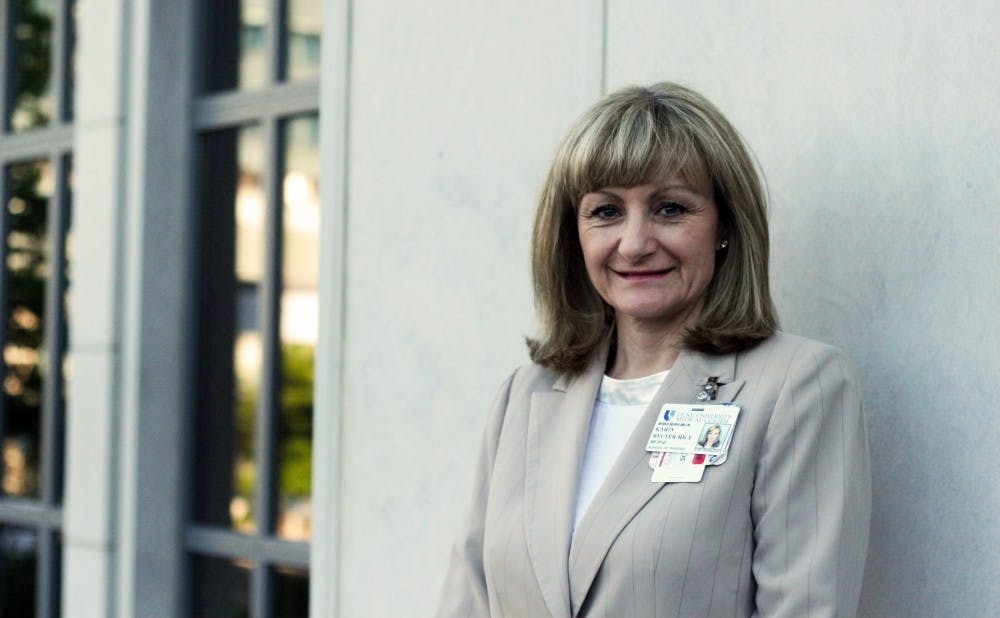Karin Reuter-Rice, assistant professor at the School of Nursing, was awarded the Robert Wood Johnson Nurse Faculty Scholar award Sept. 13 to continue her research on blood vessel spasms in pediatric intensive care unit patients. Her research focuses on vasospasms, conditions in which a blood vessel’s spasm or contraction leads to narrowing of blood vessels that can cause brain damage in the patient. Using a transcranial doppler ultrasound machine, she is able to track blood flow velocity in a patient’s brain to see if they are experiencing vasospasm. The Chronicle’s Lucy Hicks sat down with Professor Reutor-Rice and discussed her award and the future of nursing.
The Chronicle: What led you to research vasospasms in children and what previous research have you done?
Karin Reuter-Rice: I started this research with a colleague of mine in San Diego. We started looking at cerebral vasospams using a transcranial doppler ultrasound machine to see whether or not children who had experienced a traumatic brain injury and were admitted to the pediatric intensive care unit showed signs of these spasms, just as adults did. There wasn’t any good idea to say that children had the same timing of vasospams and also have the same frequency of vasospams [as adults]. We found it to be very similar.
I then came to Duke and I got some small funding from the office of research affairs and started a pilot study and looked at six children. The idea was more about feasibility: could we bring a transcranial doplar ultra sound into the pediatric ICU and on the pediatric floor at Duke? Could we also collect some biological markers and work with speech pathology to look at their cognitive and functional outcomes, because they do some standardized testing?
TC: How exactly do you use a transcranial doppler ultrasound?
KR: It has probes that you place at the temple or up around the neck... It shines its ultrasound beam and it picks up the flow velocity within the brain vessel. It’s different than what people are accustomed to—in this case you don’t see structure, you just see the velocity of flow through the vessel.
TC: What does this award entail?
KR: The award comes with a couple of components. They want to develop you to be a nurse leader and also to really move nursing education forward—so really helping you develop yourself as a better teacher, but also as a leader in the field of nursing healthcare, nursing research and then, of course, nursing education.
And then the other component of the award they actually fund part of my time as a faculty member and also my research and they do that for a three year period.
TC: Can you talk about the research you will be conducting with this grant?
KR: The research I am conducting is on children admitted to the hospital for traumatic brain injury—the injury can be caused from an accident they’ve experienced or child abuse. When the parents consent for their child to be part of the study, we do a couple of things. We look at whether or not they are experiencing vasospasm using the transcranial doppler ultrasound, and we do that on a daily basis. We also collect samples for biologic markers...and we collect samples that we will then look at to see if the gene has any polymorphism. We take blood, we take urine, and we also take cerebral spinal fluid samples if the child has a special kind of drain that drains cerebral spinal fluid.
What we are hoping to see is if there is a relationship between the gene or the biomarker and vasospasm, and ultimately—how do those children look as far as functional outcome? What do their outcomes look like when they leave the hospital? And we look at those outcomes at the time they are discharged from the hospital, and then we look at them again a month out.
TC: Nursing research is a lot more common than some students might think. Do you see nursing research increasing in the future?
KR: I think nurses are on the cutting edge of research. The thing about nursing is that we have a lot of opportunity to conduct a variety of techniques with in our research. So although my research has a clinical bedside component, it has a bench component and I also have the opportunity to look overall at functional outcomes.
So, is a nurse a great person to perform this type of research? Absolutely. Do we perform a lot other different types of research? Absolutely. And I think the salient point is that nurses work with the population at large: we work with families and patients, we work with extended family members and we are right there on the front line. I think that really gives us a tremendous amount of opportunity to really ask good questions. [Nurses can] get good clean data, really help shape the information about patients and their experiences, but also the physiology of the human being in a very thoughtful and very honest way.
TC: Do you have any ideas about your future in nursing and education?
KR: There are so many opportunities for us to develop nursing, both in an educational, academic way and also in a research format...I think they really blend well together. As well as in a practice format—we have a lot of clinical nurses who are excellent teachers and also great researchers, and I hope to be one of those in the future: a practicing nurse practitioner, which I am to this day, but also really hoping for the goal of really developing myself to be a nurse leader for pediatrics and brain injury, but also for nursing and nursing research.
Get The Chronicle straight to your inbox
Signup for our weekly newsletter. Cancel at any time.

